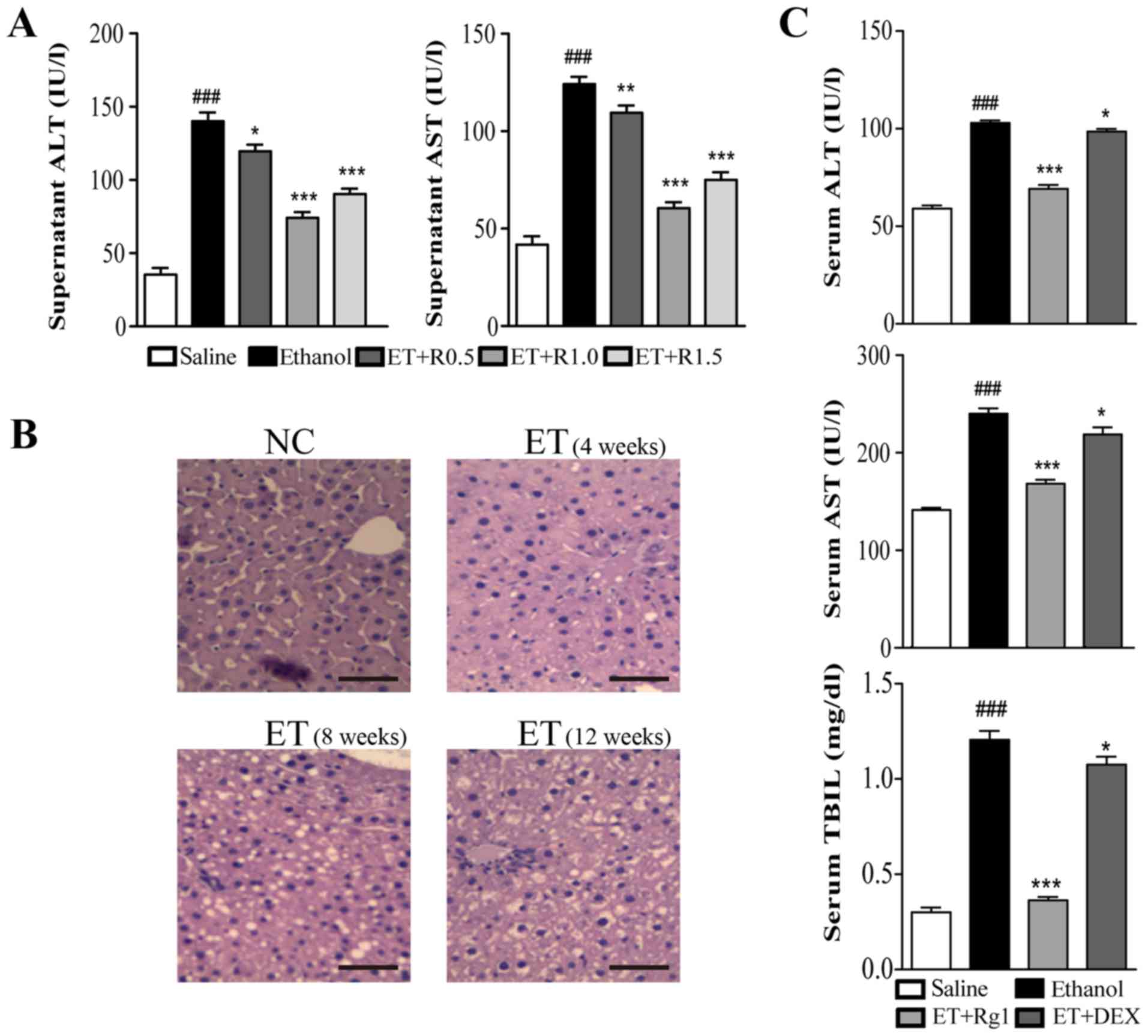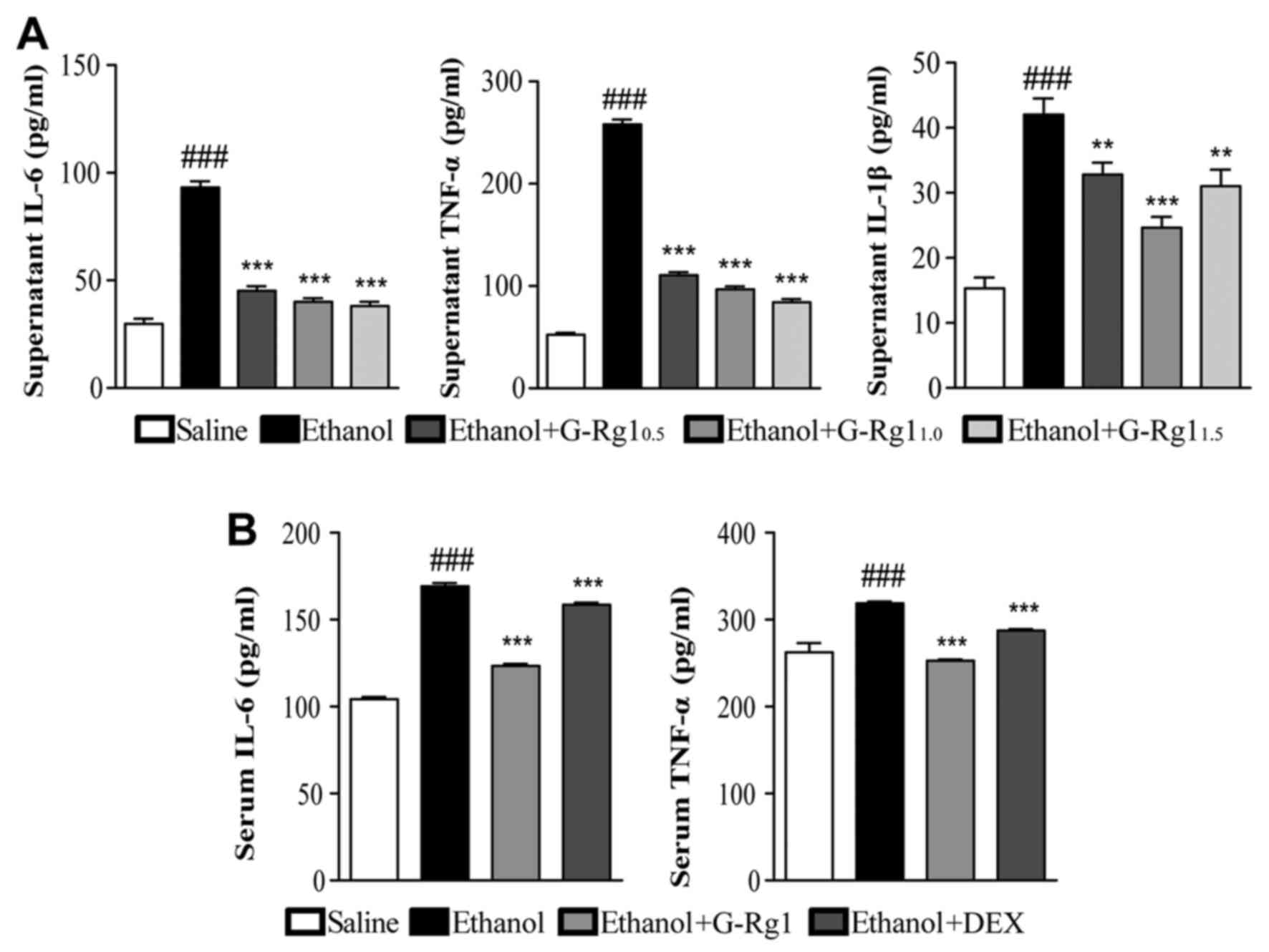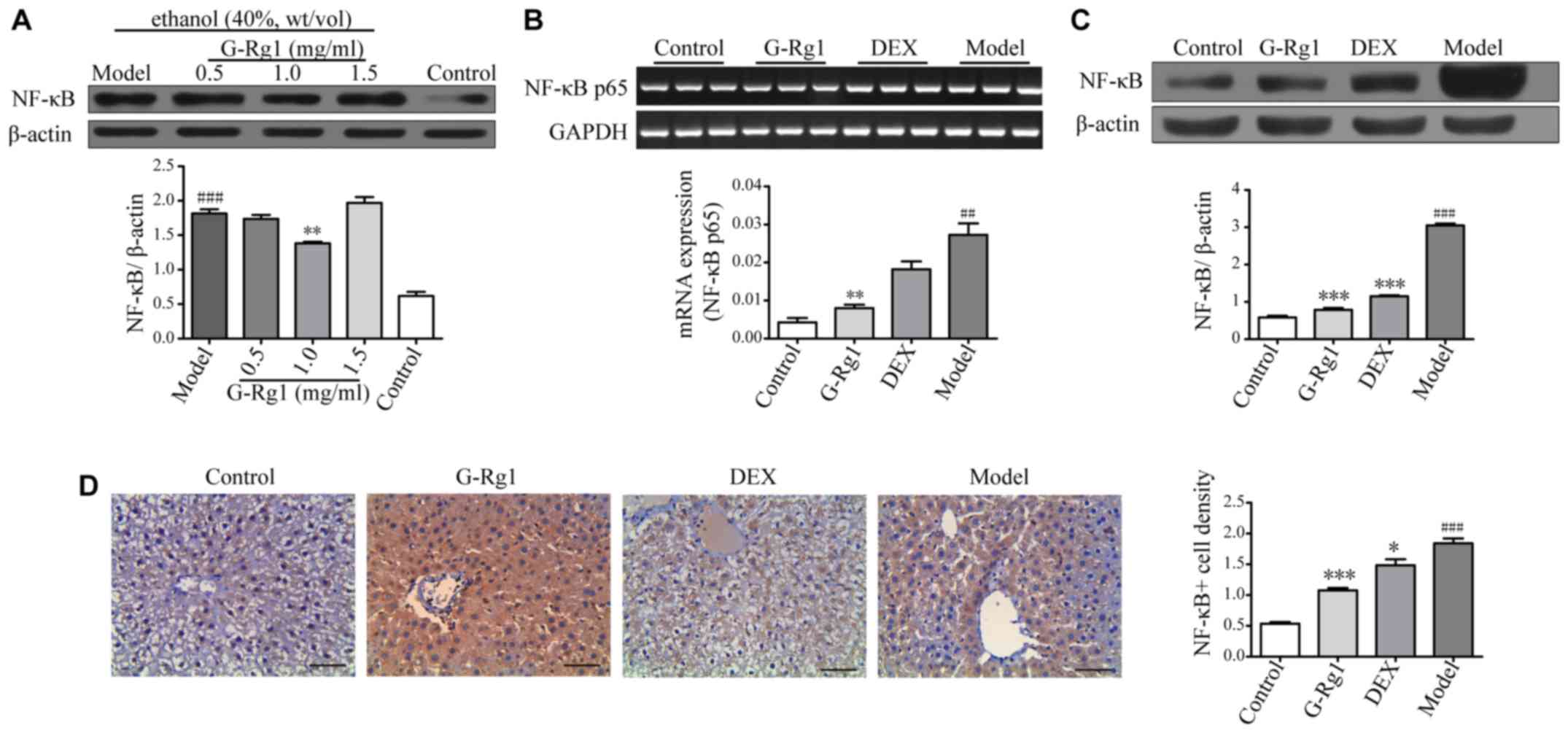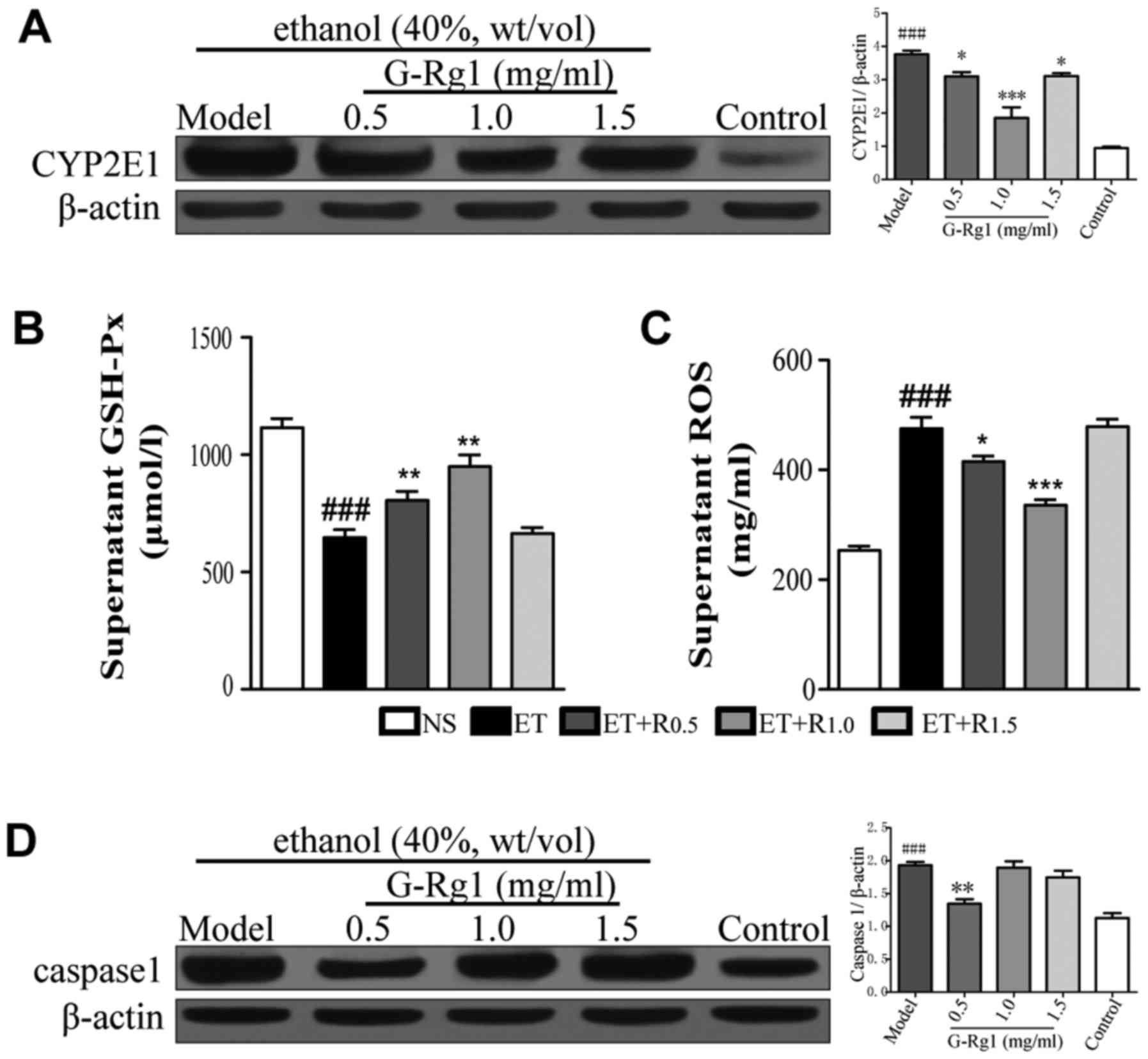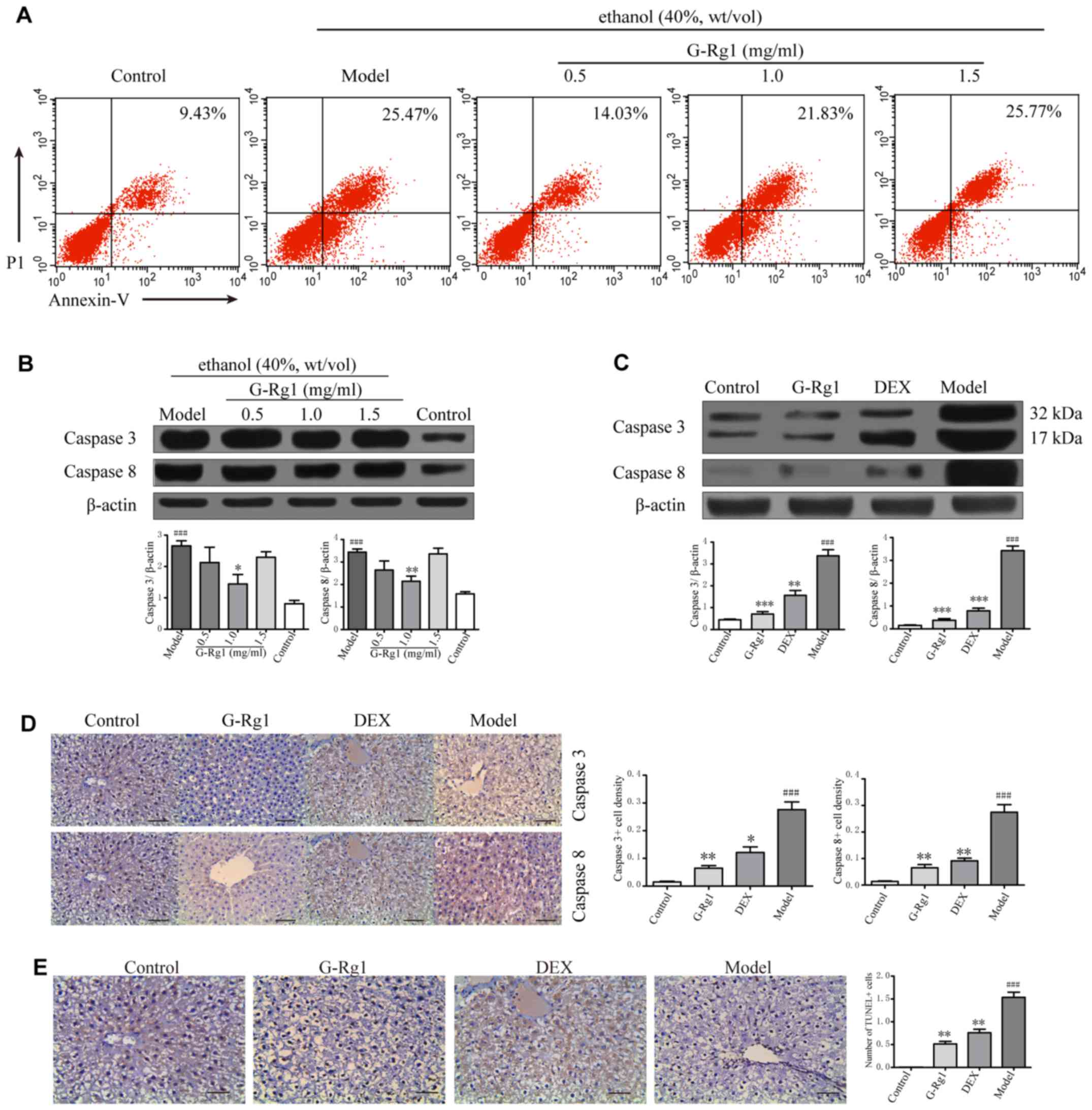|
1
|
Chang B, Li B, Huang A, Sun Y, Teng G,
Wang X, Liangpunsakul S, Li J and Zou Z: Changes of four common
non-infectious liver diseases for the hospitalized patients in
Beijing 302 hospital from 2002 to 2013. Alcohol. 54:61–65. 2016.
View Article : Google Scholar : PubMed/NCBI
|
|
2
|
Wang H, Ma L, Yin Q, Zhang X and Zhang C:
Prevalence of alcoholic liver disease and its association with
socioeconomic status in north-eastern China. Alcohol Clin Exp Res.
38:1035–1041. 2014. View Article : Google Scholar : PubMed/NCBI
|
|
3
|
Iwaisako K, Brenner DA and Kisseleva T:
What's new in liver fibrosis? The origin of myofibroblasts in liver
fibrosis. J Gastroenterol Hepatol. 27(Suppl 2): 65–68. 2012.
View Article : Google Scholar : PubMed/NCBI
|
|
4
|
Schattenberg JM, Galle PR and Schuchmann
M: Apoptosis in liver disease. Liver Int. 26:904–911. 2006.
View Article : Google Scholar : PubMed/NCBI
|
|
5
|
Zakhari S and Li TK: Determinants of
alcohol use and abuse: Impact of quantity and frequency patterns on
liver disease. Hepatology. 46:2032–2039. 2007. View Article : Google Scholar : PubMed/NCBI
|
|
6
|
You M and Crabb DW: Recent advances in
alcoholic liver disease II. Minireview: Molecular mechanisms of
alcoholic fatty liver. Am J Physiol Gastrointest Liver Physiol.
287:G1–G6. 2004. View Article : Google Scholar : PubMed/NCBI
|
|
7
|
Nagata K, Suzuki H and Sakaguchi S: Common
pathogenic mechanism in development progression of liver injury
caused by non-alcoholic or alcoholic steatohepatitis. J Toxicol
Sci. 32:453–468. 2007. View Article : Google Scholar
|
|
8
|
Enomoto N, Ikejima K, Bradford BU, Rivera
CA, Kono H, Goto M, Yamashina S, Schemmer P, Kitamura T, Oide H, et
al: Role of Kupffer cells and gut-derived endotoxins in alcoholic
liver injury. J Gastroenterol Hepatol. 15(Suppl): D20–D25. 2000.
View Article : Google Scholar : PubMed/NCBI
|
|
9
|
Gao B: Cytokines, STATs and liver disease.
Cell Mol Immunol. 2:92–100. 2005.PubMed/NCBI
|
|
10
|
Friedman SL: Hepatic stellate cells:
Protean, multifunctional, and enigmatic cells of the liver. Physiol
Rev. 88:125–172. 2008. View Article : Google Scholar : PubMed/NCBI
|
|
11
|
Xie XS, Liu HC, Wang FP, Zhang CL, Zuo C,
Deng Y and Fan JM: Ginsenoside Rg1 modulation on thrombospondin-1
and vascular endothelial growth factor expression in early renal
fibro-genesis in unilateral obstruction. Phytother Res.
24:1581–1587. 2010. View
Article : Google Scholar : PubMed/NCBI
|
|
12
|
Xu L, Chen WF and Wong MS: Ginsenoside Rg1
protects dopaminergic neurons in a rat model of Parkinson's disease
through the IGF-I receptor signalling pathway. Br J Pharmacol.
158:738–748. 2009. View Article : Google Scholar : PubMed/NCBI
|
|
13
|
Shen LH and Zhang JT: Ginsenoside Rg1
promotes proliferation of hippocampal progenitor cells. Neurol Res.
26:422–428. 2004. View Article : Google Scholar : PubMed/NCBI
|
|
14
|
Shi AW, Wang XB, Lu FX, Zhu MM, Kong XQ
and Cao KJ: Ginsenoside Rg1 promotes endothelial progenitor cell
migration and proliferation. Acta Pharmacol Sin. 30:299–306. 2009.
View Article : Google Scholar : PubMed/NCBI
|
|
15
|
Wu CF, Bi XL, Yang JY, Zhan JY, Dong YX,
Wang JH, Wang JM, Zhang R and Li X: Differential effects of
ginsenosides on NO and TNF-alpha production by LPS-activated N9
microglia. Int Immunopharmacol. 7:313–320. 2007. View Article : Google Scholar : PubMed/NCBI
|
|
16
|
Wu F, Zhang SS and Kang GF: Effects of
panax notoginseng saponins on the expression of tumor necrosis
factor alpha and secretion phospholipase A2 in rats with liver
fibrosis. Zhonghua Gan Zang Bing Za Zhi. 11:51–52. 2003.In Chinese.
PubMed/NCBI
|
|
17
|
Gao Y, Chu S, Li J, Li J, Zhang Z, Xia C,
Heng Y, Zhang M, Hu J, Wei G, et al: Anti-inflammatory function of
ginsenoside Rg1 on alcoholic hepatitis through glucocorticoid
receptor related nuclear factor-kappa B pathway. J Ethnopharmacol.
173:231–240. 2015. View Article : Google Scholar : PubMed/NCBI
|
|
18
|
Tao T, Chen F, Bo L, Xie Q, Yi W, Zou Y,
Hu B, Li J and Deng X: Ginsenoside Rg1 protects mouse liver against
ischemia-reper-fusion injury through anti-inflammatory and
anti-apoptosis properties. J Surg Res. 191:231–238. 2014.
View Article : Google Scholar : PubMed/NCBI
|
|
19
|
Zhang XJ, He C, Li P, Su H and Wan JB:
Ginsenoside Rg1, a potential JNK inhibitor, protects against
ischemia/reperfusion-induced liver damage. J Funct Foods.
15:580–592. 2015. View Article : Google Scholar
|
|
20
|
Xin Y, Wei J, Chunhua M, Danhong Y,
Jianguo Z, Zongqi C and Jian-An B: Protective effects of
Ginsenoside Rg1 against carbon tetrachloride-induced liver injury
in mice through suppression of inflammation. Phytomedicine.
23:583–588. 2016. View Article : Google Scholar : PubMed/NCBI
|
|
21
|
Geng J, Peng W, Huang Y, Fan H and Li S:
Ginsenoside-Rg1 from Panax notoginseng prevents hepatic fibrosis
induced by thioacetamide in rats. Eur J Pharmacol. 634:162–169.
2010. View Article : Google Scholar : PubMed/NCBI
|
|
22
|
Li JP, Gao Y, Chu SF, Zhang Z, Xia CY, Mou
Z, Song XY, He WB, Guo XF and Chen NH: Nrf2 pathway activation
contributes to anti-fibrosis effects of ginsenoside Rg1 in a rat
model of alcohol- and CCl4 -induced hepatic fibrosis.
Acta Pharmacol Sin. 35:1031–1044. 2014. View Article : Google Scholar : PubMed/NCBI
|
|
23
|
Zhao J, Shi Z, Liu S, Li J and Huang W:
Ginsenosides Rg1 from Panax ginseng: A potential therapy for acute
liver failure patients. Evid Based Complement Alternat Med.
538059:2014. View Article : Google Scholar
|
|
24
|
Bieghs V and Trautwein C: The innate
immune response during liver inflammation and metabolic disease.
Trends Immunol. 34:446–452. 2013. View Article : Google Scholar : PubMed/NCBI
|
|
25
|
Tsukamoto H, Reidelberger RD, French SW
and Largman C: Long-term cannulation model for blood sampling and
intragastric infusion in the rat. Am J Physiol. 247:R595–R599.
1984.PubMed/NCBI
|
|
26
|
Tsukamoto H, Horne W, Kamimura S, Niemelä
O, Parkkila S, Ylä-Herttuala S and Brittenham GM: Experimental
liver cirrhosis induced by alcohol and iron. J Clin Invest.
96:620–630. 1995. View Article : Google Scholar : PubMed/NCBI
|
|
27
|
Sedlak J and Lindsay RH: Estimation of
total, protein-bound, and nonprotein sulfhydryl groups in tissue
with Ellman's reagent. Anal Biochem. 25:192–205. 1968. View Article : Google Scholar : PubMed/NCBI
|
|
28
|
Livak KJ and Schmittgen TD: Analysis of
relative gene expression data using real-time quantitative PCR and
the 2(−Delta Delta C(T)) Method. Methods. 25:402–408. 2001.
View Article : Google Scholar
|
|
29
|
Santos Rocha SW, Silva BS, Gomes FO,
Soares e Silva AK, Raposo C, Barbosa KP, Torres DO, dos Santos AC
and Peixoto CA: Effect of diethylcarbamazine on chronic hepatic
inflammation induced by alcohol in C57BL/6 mice. Eur J Pharmacol.
689:194–203. 2012. View Article : Google Scholar : PubMed/NCBI
|
|
30
|
Singal AK, Kodali S, Vucovich LA,
Darley-Usmar V and Schiano TD: Diagnosis and treatment of alcoholic
hepatitis: A systematic review. Alcohol Clin Exp Res. 40:1390–1402.
2016. View Article : Google Scholar : PubMed/NCBI
|
|
31
|
Szabo G and Csak T: Inflammasomes in liver
diseases. J Hepatol. 57:642–654. 2012. View Article : Google Scholar : PubMed/NCBI
|
|
32
|
Walker RK, Cousins VM, Umoh NA, Jeffress
MA, Taghipour D, Al-Rubaiee M and Haddad GE: The good, the bad, and
the ugly with alcohol use and abuse on the heart. Alcohol Clin Exp
Res. 37:1253–1260. 2013. View Article : Google Scholar : PubMed/NCBI
|
|
33
|
Rehm J, Samokhvalov AV and Shield KD:
Global burden of alcoholic liver diseases. J Hepatol. 59:160–168.
2013. View Article : Google Scholar : PubMed/NCBI
|
|
34
|
Liu J, Wang X, Liu R, Liu Y, Zhang T, Fu H
and Hai C: Oleanolic acid co-administration alleviates
ethanol-induced hepatic injury via Nrf-2 and ethanol-metabolizing
modulating in rats. Chem Biol Interact. 221:88–98. 2014. View Article : Google Scholar : PubMed/NCBI
|
|
35
|
Zou Y, Tao T, Tian Y, Zhu J, Cao L, Deng X
and Li J: Ginsenoside Rg1 improves survival in a murine model of
polymicrobial sepsis by suppressing the inflammatory response and
apoptosis of lymphocytes. J Surg Res. 183:760–766. 2013. View Article : Google Scholar : PubMed/NCBI
|
|
36
|
Shen L and Zhang J: Ginsenoside Rg1
increases ischemia-induced cell proliferation and survival in the
dentate gyrus of adult gerbils. Neurosci Lett. 344:1–4. 2003.
View Article : Google Scholar : PubMed/NCBI
|
|
37
|
Karikura M, Tanizawa H, Hirata T, Miyase T
and Takino Y: Studies on absorption, distribution, excretion and
metabolism of ginseng saponins. VIII. Isotope labeling of
ginsenoside Rb2. Chem Pharm Bull (Tokyo). 40:2458–2460. 1992.
View Article : Google Scholar
|
|
38
|
Kubes P and Mehal WZ: Sterile inflammation
in the liver. Gastroenterology. 143:1158–1172. 2012. View Article : Google Scholar : PubMed/NCBI
|
|
39
|
Cao YW, Jiang Y, Zhang DY, Wang M, Chen
WS, Su H, Wang YT and Wan JB: Protective effects of Penthorum
chinense Pursh against chronic ethanol-induced liver injury in
mice. J Ethnopharmacol. 161:92–98. 2015. View Article : Google Scholar
|
|
40
|
Ding RB, Tian K, Huang LL, He CW, Jiang Y,
Wang YT and Wan JB: Herbal medicines for the prevention of
alcoholic liver disease: A review. J Ethnopharmacol. 144:457–465.
2012. View Article : Google Scholar : PubMed/NCBI
|
|
41
|
Brenner C, Galluzzi L, Kepp O and Kroemer
G: Decoding cell death signals in liver inflammation. J Hepatol.
59:583–594. 2013. View Article : Google Scholar : PubMed/NCBI
|
















